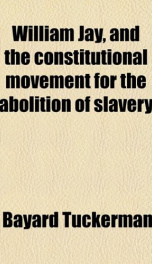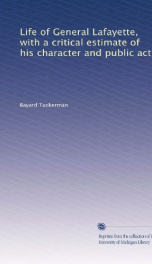william jay and the constitutional movement for the abolition of slavery

Purchase of this book includes free trial access to www.million-books.com where you can read more than a million books for free. This is an OCR edition with typos. Excerpt from book: CHAPTER VII. UNPOPULARITY OF THE ABOLITIONISTS.THE COMPROMISES OF 1850 AND THE FUGITIVE-SLAVE LAW.JAY'S Reply To Webster's 7th Of March Speech.The ATTITUDE OF THE EPISCOPAL CHURCH.THE ABROGATION OF THE MISSOURI COMPROMISE.DISUNION. The prospect was dark for the antislavery cause in 1850. Its friends had increased steadily in numbers and in earnestness. But the Slave Power had mustered all its forces in an aggressive campaign which aimed to make slavery a national instead of a local institution, to introduce it into territory hitherto free, and to browbeat the North into submission to every demand of the slaveholder. The compromise measures adopted this year in Congressabove all, the Fugitive-Slave Lawmarked the successful advance of arrogant Southern dictation. In the North, the dislike of antislavery men and the willingness to satisfy the South at the expense of conscience was expressed in such scenes as the attack of the Eynders mob on the meeting of the American Antislavery Society in New York and the passive attitude towards it adopted by the authorities. Although the plan of putting down the abolitionists by force had provedimpracticable, no efforts were spared to make their lives uncomfortable by the attacks of the press and by the pressure of social disapproval. " Our politicians," wrote Jay to Charles Sumner, " may pride themselves on their adroitness in pandering to popular prejudices, and in acquiring power and influence by seasonable changes of opinion and conduct. But a day is coming when their motives and actions will be judged by a very different tribunal than public opinion, and when a single act of benevolence, a single sacrifice of personal consideration to the cause of truth, will outweigh a whole life of obsequiousness and political trickery. ...
Info about the book
Author:
Series:
Unknown
ISBN:
1172349460
Rating:
4/5 (2)Your rating:
0/5
Languge:
English
Users who have this book
Users who want this book
What readers are saying
What do you think? Write your own comment on this book!
write a commentif you like william jay and the constitutional movement for the abolition of slavery try:
Do you want to exchange books? It’s EASY!
Get registered and find other users who want to give their favourite books to good hands!







